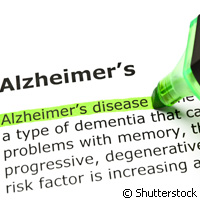Spotlight on EU-funded projects on World Alzheimer's Day
Every year on 21 September on World Alzheimer's Day, sufferers of the condition around the world are honoured and recognised in a drive to push Alzheimer's research to the top of policymaker agendas. World Alzheimer's Day began in 1994 to celebrate the 10th anniversary of the charity Alzheimer's Disease International. Ever since it has been an opportunity for Alzheimer associations around the world to raise awareness about their work and put the spotlight on the impact dementia has for sufferers and their careers as well as health systems the world over. The day is also an opportunity to take stock of the research being funded by the European Commission as part of the Seventh Framework Programme (FP7). Research on neurodegenerative diseases under FP7 has gone much further than in previous framework programmes. Since 2007 over EUR 100 million has been dedicated to research on Alzheimer's disease. This increased focus on the disease stems from the recognition that one of Europe's biggest challenges is how to deal with its ageing population. Most of the funding into Alzheimer's under FP7 has been carried out under its 'Health' Theme, about EUR 60 million in total. These projects focus primarily on gaining a better understanding of the pathophysiology of Alzheimer's disease and the development of new diagnostic and therapeutic targets. One such project is LUPAS ('Luminescent polymers for in vivo imaging of amyloid signatures') which was given a EUR 4,978,094 funding boost. The project aims to bridge the gap between diagnosis and treatment of Alzheimer's disease and prion diseases. By developing novel agents and methods for diagnostic imaging of amyloid plaque, the LUPAS team, made up of researchers from France, Germany, Israel, Sweden, Switzerland and Norway, believe it is possible to improve diagnosis quality as well as facilitate better monitoring and understanding of how the disease progresses. But in keeping with the cross-disciplinary approach to EU research funding, Alzheimer's disease has also been a focus of other FP7 themes such as 'Nanosciences, nanotechnologies, materials and new production technologies' and 'Information and communication technologies'. Research into Alzheimer's disease is also being carried out as part of the Joint Programming on Neurodegenerative Diseases (JPND) initiative, funded by the EU as part of the JUMPAHEAD ('Coordination Action in support of the implementation of a Joint Programming Initiative for Combating Neurodegenerative Diseases, in particular Alzheimer s disease') project. The JPND was the first joint programming initiative (JPI) to be set up and involves 23 countries. It is currently implementing a call for proposals focusing on neurodegenerative diseases and the optimisation of biomarkers and harmonisation of their use between clinical centres. Approximately EUR 14 million has been set aside for this specific call. Research on neurodegenerative diseases has also been addressed as part of the Innovative Medicines Initiative Joint Undertaking (IMI JU), a public-private partnership between the European Commission and the pharmaceutical industry represented by the European Federation of Pharmaceutical Industries and Associations (EFPIA).The IMI JU activities includes support for the discovery of new tools to improve the efficacy of drugs against Alzheimer's disease. Look out for events taking place throughout September in your country to celebrate World Alzheimer's Day.For more information, please visit: FP7-HEALTH research: http://cordis.europa.eu/fp7/health/ JPND research: www.neurodegenerationresearch.eu Alzheimer's Disease International: http://www.alz.co.uk/
Countries
Switzerland, Germany, France, Israel, Norway, Sweden



